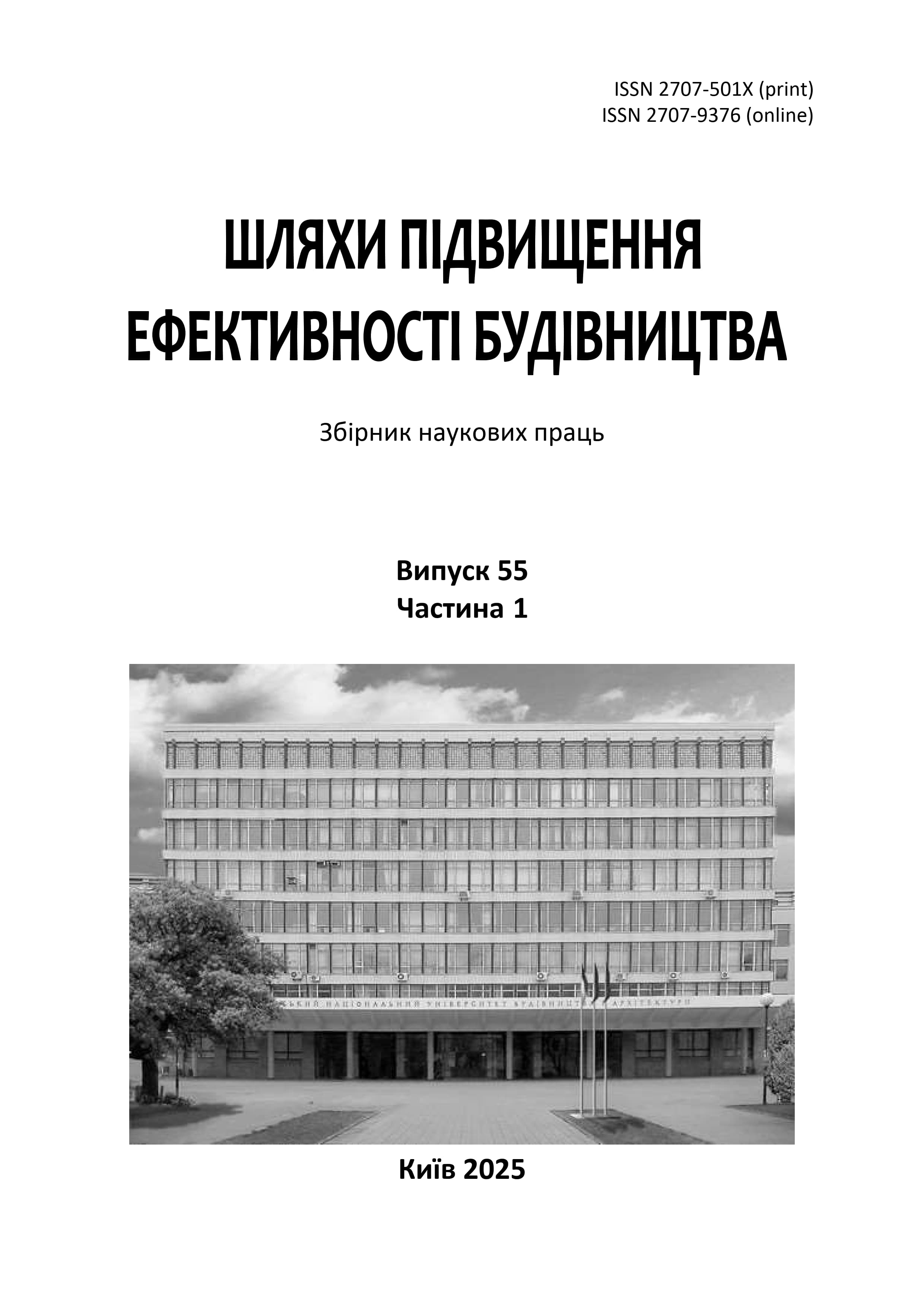Methodological and practical foundations for the transformation of operational activities of enterprises in the field of construction engineering and management consulting
DOI:
https://doi.org/10.32347/2707-501x.2025.55(1).100-115Keywords:
transformation, operational activities, construction engineering, management consulting, reengineering, digitalization, BIM technologies, strategic management, automation, business modelsAbstract
The transformation of operational activities of enterprises in the field of construction engineering and management consulting is a pressing issue driven by increasing competition, dynamic technological development, and changes in the regulatory environment. The methodological foundations of this transformation include systemic analysis, which allows identifying bottlenecks in current business processes, and strategic management aimed at forming long-term competitive advantages. The application of business process reengineering concepts ensures the optimization of operational activities through redistribution and automation.
The practical aspects of transformation involve the implementation of digital technologies such as information and communication systems, artificial intelligence, big data, and cloud computing. These contribute to improved managerial decision-making, enhanced project execution efficiency, and greater flexibility in interactions with clients and partners. In construction engineering, the transformation of operational activities occurs through the introduction of BIM technologies, which enable real-time modeling of project solutions, risk analysis, and cost minimization at the design stage. In management consulting, transformation includes adapting business models to new market conditions, expanding service offerings through the integration of digital platforms, and utilizing analytical methods for trend forecasting.
Moreover, a significant impact on transformation processes is exerted by changes in organizational culture, which involve engaging personnel in digitalization processes, developing new competencies, and applying modern knowledge management methods. Tools ensuring effective transformation include a performance indicator system (KPI) that allows monitoring and evaluating changes in operational activities, as well as project management methodologies such as Agile and Lean, which contribute to greater adaptability to changing market conditions. Also important is the involvement of external experts and consulting firms, which provide an independent assessment of the current state of the enterprise and develop recommendations for further optimization.
Compliance with regulatory requirements and international standards is key to ensuring sustainable development and aligning transformational changes with the modern demands of the industry. As a result of implementing a comprehensive approach to the transformation of operational activities, enterprises achieve increased efficiency, reduced operational costs, improved stakeholder interactions, and strengthened market positions.
References
Chupryna Yu., Ivakhnenko I., Biloshchytskyi A., Zinchenko M., Plys N. Tools For Assessing The Competitiveness Of A Construction Company As A Contractor In Public-Private Partnership Projects. 2024 IEEE 4th International Conference on Smart Information Systems and Technologies (SIST), Astana, Kazakhstan, 2024, pp. 473-481
Аксельрод Р.Б. Науково-методологічні засади управління процесами трансформації будівельних підприємств: дис. … д-ра екон. наук: 08.00.04. Київ, 2022. 437 с.
Войтович В.А., Чуприна Ю.А. Оптимізація та контроль програми робіт в підсистемі фінансового менеджменту будівельної організації. Шляхи підвищення ефективності будівництва,2023, 51(1), 129–142.
Халіна В.Ю., Абєлєнцев Є.В. Транспарентність діяльності підприємства як елемент нової бізнес-моделі. Науковий журнал «Інтернаука». 2023. № 16. URL: https://www.inter-nauka.com/issues/2023/16/9256.
Деркач А.Є. Економіко-цифровий інструментарій впровадження реінжинірингу на будівельному підприємстві: дис. … канд. екон. наук: 051. Київ: КНУБА, 2023. 250 с.
Фоміна О., Литвинчук Д. Європейські тенденції розвитку консалтингу. Економіка та суспільство, 2024, (60). https://doi.org/10.32782/2524-0072/2024-60-55.
Кащишин В.М. Економічне оцінювання та обґрунтування інжинірингових проектів машинобудівних підприємств: дис. … канд. екон. наук: 08.00.04. Львів: Національний університет «Львівська політехніка», 2018. 253 с.
Копитко М.І., Верескля М.Р.,Групська Х.А. Тенденції і виклики у сфері консалтингу та управління бізнес-процесами. Соціально-правові студії. 2021. Випуск 2 (12). С. 151–159
Ордуханов Т.Г. Ефективність інвестиційної політики будівельних підприємств в умовах глобальних трансформацій. Наукові праці Міжрегіональної Академії управління персоналом. Економічні науки. 2023. Вип. 5(72) С. 39-44. DOI: https://doi.org/10.32689/2523-4536/72-6.
Мудра М.С. Економічна оцінка інноваційного розвитку підприємств в системі будівельного девелопмент: дис. … канд. екон. наук: 051. Київ: КНУБА, 2024. 230 с.
Прокопенко Н.С., Циба О.В. Система управління інноваційним розвитком будівельних підприємств: організаційний аспект. Інвестиції: практика та досвід. 2024. №3. С. 48-57. DOI: 10.32702/2306 6814.2024.3.48
Прав Ю. Модель стратегії управління розвитком інноваційних процесів на будівельних підприємствах. Актуальні проблеми державного управління, 2020, 1(57), 83-89. https://doi.org/10.34213/ap.20.01.09.
Ринкевич Н.С. Трансформація організаційної культури підприємств в умовах модернізації: дис. ... канд. екон. наук: 08.00.04.НАН України, Ін-т економіки пром-сті. Київ, 2020. 326 с.
Shah F., Bhatti O., Ahmed S. Project Management Practices in Construction Projects and Their Roles in Achieving Sustainability-A Comprehensive Review. Engineering Proceedings, 2023, 44. DOI: 10.3390/engproc2023044002.
Шевчук О.А. Методологія забезпечення стійкості економічного розвитку машинобудівних підприємств на засадах бізнес-лідерства: дис. … д-ра екон. наук: 08.00.04. Київ: Національний технічний університет України «КПІ імені Ігоря Сікорського», 2021. 490 с.
Downloads
Published
How to Cite
Issue
Section
License

This work is licensed under a Creative Commons Attribution 4.0 International License.
Authors who publish with this journal agree to the following terms:
- Authors retain copyright and grant the journal right of first publication with the work simultaneously licensed under a Creative Commons Attribution License that allows others to share the work with an acknowledgement of the work's authorship and initial publication in this journal.
- Authors are able to enter into separate, additional contractual arrangements for the non-exclusive distribution of the journal's published version of the work (e.g., post it to an institutional repository or publish it in a book), with an acknowledgement of its initial publication in this journal.
- Authors are permitted and encouraged to post their work online (e.g., in institutional repositories or on their website) prior to and during the submission process, as it can lead to productive exchanges, as well as earlier and greater citation of published work (See The Effect of Open Access).

